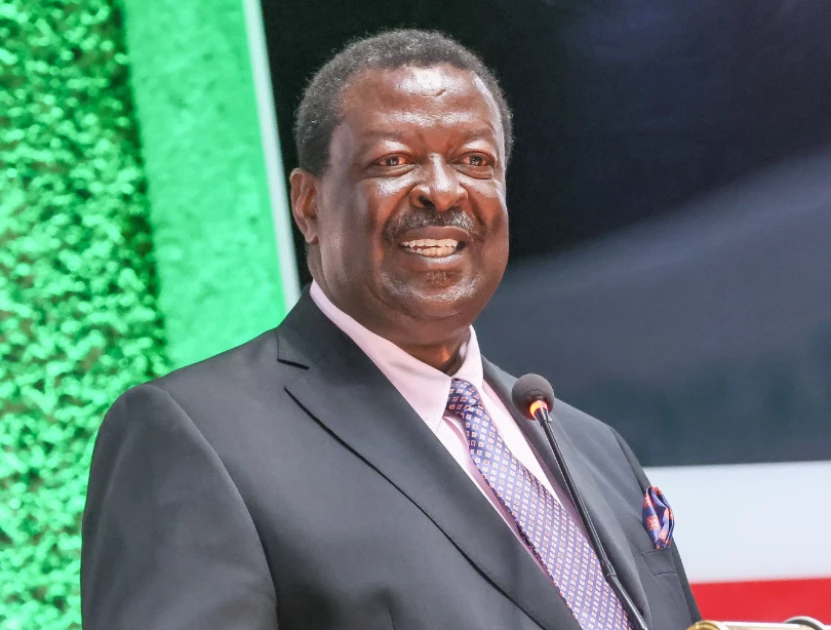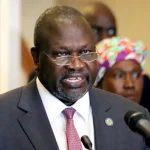Kenya’s economic projections are looking up, with growth improvement rising from 4.8 percent in 2022 to 5.2 per cent in 2023, Prime Cabinet Secretary Musalia Mudavadi has said. Similarly, projections have pointed to an even greater growth in the 2024 review.
Mudavadi said inflation significantly dropped from 9.2 percent in September 2022, to 3.5 percent in February 2025. According to him, statistics show a positive growth in the overall Gross Domestic Product indicators.
“This has markedly reduced the cost of living and improved household incomes. Furthermore, the exchange rate has stabilized and interest rates fallen, improving credit access to the private sector.” said Mudavadi.
The Prime CS said the current figures come against the backdrop of the Government’s Mid-term Review and calls for the government to re-look at its score card report for the past two and a half years and assess its performance in scaling up strategies to improve service delivery to citizens.
He emphasized that prudent management of resources becomes even more urgent within government.
“During the ninth review of our programme with the International Monetary Fund recently, Kenya terminated the multi-year programme, forgoing over Sh110 billion ($853.5 million) in budget and balance of payments support. To bridge this gap, we have to tighten our belts, as we follow up on our formal request for a new IMF programme.” noted the Prime CS.
“The critical lesson we have learnt from this is the urgent need for us to grow our own internal resources, to reduce dependency on foreign aid. We must deal firmly with corruption, which is the greatest existential threat to our country’s economic growth and social transformation. That is why we have invited the IMF to undertake a Governance Diagnostic Assessment, to identify weaknesses and corruption vulnerabilities in core state functions that are critical to macroeconomic stability and growth.” added Mudavadi.
This he said will help in developing and implementing a robust governance reform plan for the next few years.
“I call upon all Kenyans and the relevant leadership and institutions to fully support this initiative and avail the necessary data and information especially the respective ministries when called upon to do so.” urged Mudavadi.
Mudavadi said the government is cognizant of the higher expectations of Kenyans more than ever before since citizens are yearning for more from the Government and its leaders especially in delivering on the main pillars of the Bottom-Up Economic Transformation Agenda, BETA.
“One of the BETA pillars, Universal Health Coverage is frequently in the news. Over 20.6 million Kenyans have registered for the healthcare program, marking a significant step in the transition from the National Health Insurance Fund to the Social Health Authority. 7. While the new healthcare financing model improves the citizens’ access to quality and affordable healthcare, we must address the fundamental issues emerging from the people who interact with the system. These include the eligibility of SHA members, which is determined by a means testing criteria that just over four million Kenyans have completed. This implies that 80 percent of the registered members cannot fully enjoy the envisaged benefits. The therapy is to scale up public communication and stakeholder engagement, to fully onboard all Kenyans on the SHA platform.” he explained.
Mudavadi also noted that government is deepening dialogue with the private healthcare providers on the Government’s commitment to settle historical NHIF debts, accumulated to an estimated Sh33 billion in the past decade.
He stated that government has already paid Sh8.6 billion and President Ruto has assured that all verified debts will be settled, starting with Sh10 million and below owed to small hospitals that constitute 91 percent of the creditors.
Mudavadi also gave the governments’ assurance that issues emerging around the affordable housing agenda are being addressed noting that key milestones have already been achieved, including launching the construction of 95,737 affordable, social and institutional housing units across the country.
He added that the initiative has up to date triggered at least 200,000 direct and indirect jobs and further, created business opportunities worth Sh 4.4 billion for Jua Kali and other micro, small and medium enterprises.
“The key message is about creating sustainable opportunities for jobs, incomes and shared prosperity. The Government is stepping up its promise to build 250,000 houses a year, and Kenyans will see how much affordable housing stimulates economic growth and promotes equity and inclusivity in the distribution of resources.” he explained.
“Kenyans are constantly reminding us of our responsibility as leaders to deliver on the social compact they signed when they elected the Kenya Kwanza Administration. There is need for us to engage more constructively with the people, to persuade them to give us another term to realize our dream of building an industrialized and prosperous Kenya for all.” noted Mudavadi.



